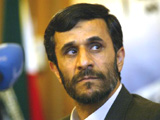|
|
TODAY.AZ / Politics
Mahmud Ahmadinejad: "If the nuclear fuel cycle is a bad thing, then you should not have it either, and if it is good, then why can't Iran have it?"
06 May 2006 [12:05] - TODAY.AZ

According to RFE/RL, he also said Iran's "enemies" should begin respecting his country's people. The Iranian leader's remarks come as the United Nations Security Council is considering whether to impose sanctions on Tehran for refusing to abandon uranium enrichment, which the West fears may be used for nuclear weapons.
Ahmadinejad is known for his controversial comments. But today he defended Iran's right to pursue a nuclear program by invoking the standards of international law.
"We don't make tough comments, we express our legal rights," Ahmadinejad said. "There are a few countries that are against the progress of other nations. They say any nation that wants to progress must ask for their permission. This is against all international laws. No independent country accepts it."
Ahmadinejad asked directly why Iran shouldn't be allowed a nuclear program when other countries are free to develop their own nuclear capacity.
"Our position is based on international laws," Ahmadinejad said. "You see that those countries who are against us have no legal basis [to support their claims]. They have nuclear power, they even have nuclear weapons, but they tell us we should not have peaceful [nuclear] energy. If the nuclear fuel cycle is a bad thing, then you should not have it either, and if it is good, then why can't [Iran] have it? All countries should have it."
Speaking earlier at today's Economic Cooperation Organization summit, the Iranian leader told heads of state and other top officials that so-called "enemies" of his country must "begin respecting the people of Iran."
He also accused Western countries of trying to establish a "nuclear apartheid" by attempting to block programs like Iran's, which he said was for energy purposes only.
Ahmadinejad appeared to have received a warm reception in Baku.
The summit's host, Azerbaijani President Ilham Aliyev, added his voice in supporting Iran's right to develop peaceful nuclear energy.
"Everything should be resolved based on the norms and principles of international law," Aliyev said. "If international law and regulations of international organizations provides the opportunity for a country to obtain nuclear energy, then there should not be any contradiction [in] this respect."
Aliyev also appealed to the international community to resolve the Iran nuclear standoff through diplomatic efforts.
The summit was short-lived, opening and closing yesterday. On May 4, diplomats from ECO countries met to discuss trade, transport, and the region's energy security.
The ECO consists of Iran, Pakistan, Turkey, the five countries of Central Asia, Azerbaijan, and Afghanistan.
The talks were largely overshadowed by the Iran nuclear standoff -- and the presence of Ahmadinejad. The Iranian leader met on the sidelines of the summit today with top officials from Afghanistan, Azerbaijan, Pakistan, and Turkey.
Ahmadinejad reportedly urged fellow ECO members to cooperate at a time when, in his words, "big powers" are attempting to "consolidate their domination and influence."
Ahmadinejad's comments come while the five permanent members of the UN Security Council are discussing a French-British draft resolution demanding a halt to Iran's uranium enrichment. The draft says Iran could possibly face further action, which could include sanctions.
Speaking on May 4, Iran's ambassador to the UN accused the United States and its allies of creating a crisis by tabling the draft resolution.
Javad Zarif said there was a need for "serious" and "reasonable" discussion.
"If [the draft resolution] is an attempt to get Iran to agree, it's not a good one," Zarif said. "I think Iran has made it very clear that we are prepared to move forward with transparency measures, Iran is prepared for a negotiated solution, but we always made it also clear that Iran does not respond well to threat and intimidation."
Russia and China, who are both members of the Security Council with power of veto, are reportedly against strong action.
/www.rferl.com/
URL: http://www.today.az/news/politics/25832.html
 Print version
Print version
Connect with us. Get latest news and updates.
See Also
- 22 February 2026 [19:00]
Azerbaijan Defense Ministry releases weekly summary video [VIDEO] - 22 February 2026 [16:39]
Azerbaijani Defense Minister visits Air Force Units - 22 February 2026 [15:11]
Head of State Service for Mobilization and Conscription listens to citizens' appeals - 22 February 2026 [14:25]
President Ilham Aliyev sends congratulatory letter to King of Saudi Arabia - 22 February 2026 [10:29]
Turkish Parliament to host event on 34th anniversary of Khojaly Genocide - 22 February 2026 [10:00]
Azerbaijan, Pakistan Foreign Ministers discuss regional and international security - 22 February 2026 [08:30]
Azerbaijan aligns with China’s Belt and Road strategy through Middle Corridor - 21 February 2026 [17:55]
TURKPA and OSCE PA discuss expanded cooperation at 25th Winter Session in Vienna - 21 February 2026 [14:00]
Azerbaijan approves action plan to ensure efficient use of water resources in Nakhchivan for 2026-2030 -decree - 21 February 2026 [10:45]
Azerbaijan participates in 14th meeting of OTS Ministers of Economy and Trade
Most Popular
 National Library marks anniversary of acclaimed poet
National Library marks anniversary of acclaimed poet
 Donald Trump directs US government to prepare release of files on aliens
Donald Trump directs US government to prepare release of files on aliens
 Japan seeks peace treaty with Russia despite ongoing territorial dispute
Japan seeks peace treaty with Russia despite ongoing territorial dispute
 China, Iran, Russia to hold Middle East drills
China, Iran, Russia to hold Middle East drills
 Hybrid threats and diplomatic shockwaves: Moscow's battle for South Caucasus
Hybrid threats and diplomatic shockwaves: Moscow's battle for South Caucasus
 Footage of President Ilham Aliyev's participation in 1st meeting of Board of Peace posted on his social media accounts
Footage of President Ilham Aliyev's participation in 1st meeting of Board of Peace posted on his social media accounts
 Poland bans Chinese cars from military facilities
Poland bans Chinese cars from military facilities
